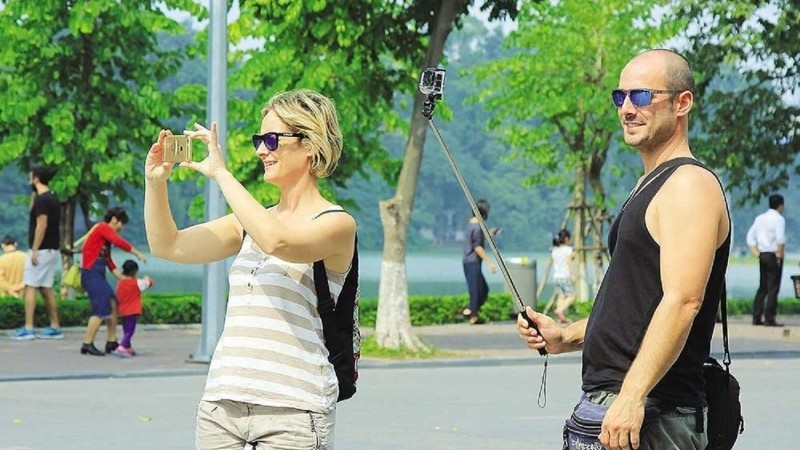Visa relaxation — a driving force to attract international visitors
With strategic steps to improve visa policies towards greater openness and flexibility, Viet Nam is facing a wide-open opportunity to welcome the growth wave of international visitor. This contributes to realising the goal of both quantity and quality development, quickly turning tourism into a spearhead economic sector.

Growth leverage for international visitor
Recently, the government issued Resolution No. 229/NQ-CP on visa exemption under the tourism stimulus programme for citizens of 12 countries: Belgium, Bulgaria, Croatia, Czech Republic, Hungary, Luxembourg, the Netherlands, Poland, Romania, Slovakia, Slovenia, and Switzerland. Citizens of these countries are allowed to stay temporarily for 45 days from the date of entry for tourism purposes, regardless of passport type, on the basis of meeting all entry conditions according to Vietnamese law. This policy is in effect from August 15, 2025, to August 14, 2028.
Along with the above policy, the government also issued Decree No. 221/2025/ND-CP on temporary visa exemption for foreigners in special need of incentives to serve socio-economic development, including guests of Party and State leaders; scholars, experts; investors and leaders of major enterprises; celebrities working in the fields of culture, arts, sports, tourism; and other special cases. The decree took effect on August 15, 2025.
According to experts, the new regulation not only creates a growth lever for international tourist but also shows Viet Nam's open-mindedness for deep integration. A report by the World Tourism Organisation shows that visa exemption can help increase the number of international visitors by 5 to 25%. Most countries are applying flexible visa policies or visa exemptions to attract visitors, and Viet Nam cannot be out of the trend.
Vu Van Tuyen, Director of Travelogy at Viet Nam Tourism Company, said that in the context of increasingly fierce competition for destinations in Southeast Asia — where countries such as Thailand, Singapore, and Malaysia have taken the lead in visa policies, Viet Nam's relaxation of entry procedures is a positive signal to enhance the competitive advantage of the tourism industry.
Attracting tourists through in-depth experiences
According to data from the General Statistics Office, in the first seven months of 2025, Viet Nam welcomed a record number of international visitors with more than 12.2 million arrivals, an increase of nearly 23% compared to the same period in 2024 and an increase of 25% compared to 2019 - before the Covid-19 pandemic. Therefore, experts expect the impact of the new visa policy will help Viet Nam easily conquer the goal of welcoming 22–23 million international visitors this year and possibly reach 25–30 million visitors in 2026 if the situation develops positively.
However, it must be affirmed that visa exemption is only the initial opening action to attract tourists. If tourists are to stay longer and spend more, the decisive factor is still to build a synchronous ecosystem with quality services, unique products, professional human resources, and synchronous infrastructure.
Pham Hai Quynh, Director of the Asian Tourism Development Institute, said that with its beautiful natural resources, rich culture, friendly people, and especially stable politics and security, Viet Nam possesses many advantages to attract high-quality tourists. To take advantage of the strength of the visa policy expansion, it is important to intensify international communication campaigns, especially for targeting markets and travellers.
With strategic steps to improve visa policies in a more open and flexible direction, Viet Nam is facing a wide opportunity to welcome the wave of international tourist growth.
It is necessary to invest more in tourism infrastructure and improve service quality to meet the high demands of luxury tourists; and create cooperative relationships with international travel companies, with the organisation of events and seminars to introduce Viet Nam and unique travel experiences. In addition, it is necessary to promote training of tourism human resources to improve service and management skills, meeting the high demands of tourists. Moreover, it needs to focus on developing new tourism products, such as community tourism associated with local culture and livelihoods, eco-tourism, cultural tourism, and adventure tourism to diversify choices for tourists.
Vu Van Tuyen analysed that European tourists, luxury tourists, and celebrities often seek unique experiences and spiritual values rather than simple trips. Therefore, international communication needs to focus on personal experience stories and strongly spread them on digital platforms.
European tourists often prefer long-term tours, combining relaxation and exploration, while super-rich tourists and celebrities require exclusive and private products. Therefore, Viet Nam's visa exemption with a temporary stay of up to 45 days creates very favourable conditions for travel companies to build personalised and in-depth itineraries.
These could be tours to explore the nature in the Northeastern and Northwestern regions, to learn about the beauty of the heritages recognised by UNESCO; or high-end tours for super-rich tourists, with private yachts on Ha Long Bay, luxury villas on Phu Quoc Island, and international golf courses; or tours to experience local culture. On that basis, positioning Viet Nam as a destination for authentic and unique experiences.
This is the way to enhance the competitiveness of the Vietnamese tourism, helping to attract high-end visitors, who always want to seek places where they cannot find similar experiences anywhere else. The resonance of favourable policies, quality services, and impressive products will not only attract visitors to come once, but also make them come back many times, becoming "voluntary tourism ambassadors" of Viet Nam.








